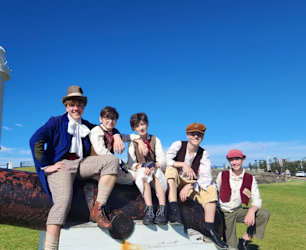With each step around the room there’s a squelching exhale from her shoes as our coach insists, “Keep writing. Keep writing. Keep writing.” The sterile room is filled with people I won’t say much to; artists, a teacher, writers of various ilk, a documentary maker, a journalist, a self-styled ‘sticky beak’ and me.
It is day one of the South Coast Writer’s Centre’s fabulous True Story festival; it’s workshop day.
For a writer, I don’t much act like one. My inner critic won’t let me put much down onto paper and this is my first actual writers' workshop. I feel totally out of my depth. But guided by memoirist Ailsa Piper – who tells us, “The truth is, everyone does have a book in them. That’s not the issue. It’s getting it onto the page” – my writing life starts to come into focus.
Ailsa has been described as a ‘super observer’. Her latest book, For Life: A memoir of living and dying – and flying, is filled with moments brought to life through her detailed observations of the natural world. The workshop promises to ‘expand your writerly observational skills’ and we soon learn what this means.
“Make yourself porous to the world,” Ailsa says. “Think of yourself as a bowerbird.”
Ailsa tells us how she will pull up a chair in a cafe, notebook at the ready, to capture bits of conversation, ferreting them away for possible use later. As a naturally curious person (it’s impolite to say ‘nosey’), I relish this idea, although I’m not quite as keen to mess up a notebook. That thought is soon put to bed also: “Don’t be afraid to blaspheme the page,” she says, encouragingly.
The class is told that creative process involves movement. Think about it – musicians move their bodies; whether they are playing drums or a violin, they are not still. Same with painters. There’s flourishes of the wrist and arm, and bending and craning. Writers though, we are sat at a desk mostly, elbows tucked tight to our sides, only our fingers moving across the keyboard.
And so Ailsa has us skip and crawl around the room, use only pen and paper and feel the cramping and see the smudges on the page and, for short periods, write with our non-dominant hands. “Walking and movement frees the brain to dream,” she explains.

We look closely at objects familiar and those foraged that morning especially for us. And we write. And write. And write.
The three hours fly past and my notebook is filled with pages of almost undecipherable work. When did I forget how to physically write? Ailsa implores us not to go back and read the pages straight away but rather leave them for a few days. Only then are we to let the ‘curator’ (not the critic) in. The curator comes in after the work is done, after the work is what it wants to be.
I leave brimming with ideas and potential and her beautiful book, which puts into practice all that we have learned during the session. For a perfectionist who is scared of failing, one statement resonates with me:
“We’re always told there’s a right and a wrong way to do things. But there’s not. There’s only your way.”
I take that and tuck it away, ready for when I need it.
Ailsa Piper’s book For Life, a memoir of living and dying – and flying, about grief and hope and the healing power of nature, is available now.







